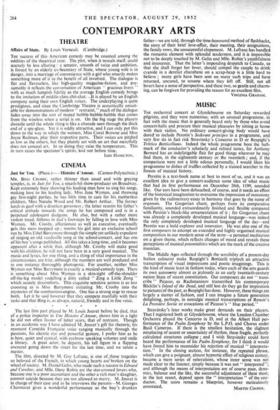MUSIC
THE orchestral concert at Glyndebourne on Saturday rewarded pilgrims, and they were numerous,' with an unusual programme, in fact with the music that is generally heard only by those who avoid concert-halls and procure their musical pleasures by sitting at home with their radios. No ordinary concert-giving body would have dared' to include Perotin's Sederunt principes in a programme, and very few do in fact risk Stravinsky's Concerto in D or Respighi's Trittico Botticelliano. Indeed the whole programme bore the hall- mark of the conductor's scholarly and refined tastes, for Anthony Bernard has an indefatigable flair for good things wherever he may find them, in the eighteenth century or the twentieth ; and, if the comparison were not a little odious personally, I would liken his programme to dishes of truffles collected by a trained searcher in the forests of musical history.
Perotin is a text-book name at best to most of us, and it was an excellent idea to give a concert-audience some idea of what music that had its first performance on December 26th, 1199, sounded like. Our ears have been debauched, of course, and it needs an effort of the historical imagination to overcome the impression of monotony given by the rudimentary•essay in harmony that goes by the name of organum. The Gregorian chant, perhaps from its comparative familiarity, sounded extraordinarily finished and flexible compared ' with Perotin's block-like ornamentation of it ; for Gregorian chant was already a completely developed musical language—was indeed the only completely developed musical language of the day—and Perotin was a bold explorer and innovator. He was also one of the first composers to attempt an extended and highly organised Musical composition in our modem sense of the term—a personal meditation on a given theme, which reflects changes of mood and reveals those perceptions of musical potentialities which are the mark of the creative musician.
The Middle Ages reflected through the sensibility of a present-day Italian colourist make Respighi's Botticelli triptych an attractive transcription of visual impressions and poetic imaginings. This is the kind of music least in fashion today, when each of the arts guards its own autonomy almost as jealously as an early twentieth-century nation State of recent constitution. Our composers do not " trans- cribe " Picasso, as Rachmaninov transcribed his contemporary Bocklin's Island of the Dead, and still less do they go for inspiration to pictures:of the past, as Respighi has done. However, these things are largely a matter of fashion, and I can imagine a future generation delighting, perhaps, in nostalgic musical transcriptions of Renoir's La Premiere Sortie or evocations of Picasso's " blue period."
Stravinsky's later works make great demands on their players. That I registered both at Glyndebourne, where the London Chamber Orchestra played the Concerto in D, and at the Albert Hall per- formance of the Psalm Symphony by the L.P.O. and Chorus under Basil Cameron. If there is the smallest hesitation, the slightest misplacing of accent or uncertainty of rhythm, these fragile, perfectly calculated structures collapse ; and I wish Stravinsky could have heard the performance of his Psalm Symphony, for I think it would have forced him to reconsider his rejection of musical " interpreta- tion." In the closing section, for instance, the repeated phrase, which can give a poignant, almost hypnotic effect of religious ecstasy, became a mere series of reiterations, whose inner sense was not made clear to the listener, simply because it was not " interpreted"; and although the means of interpretation are of course pace, dyna- mics, balance and the like, the successful adjustment of these must, in the last resort, depend upon the " interpretation " of the con- ductor. The score remains a blueprint, however meticulously annotated:
MARTIN COOPER.


































 Previous page
Previous page